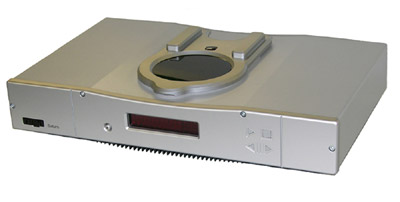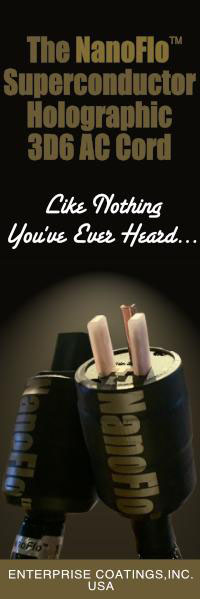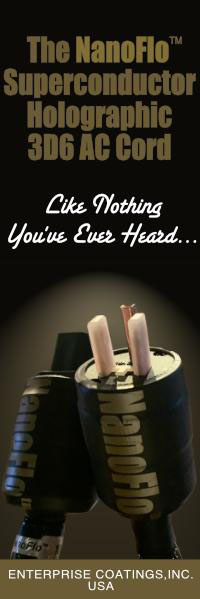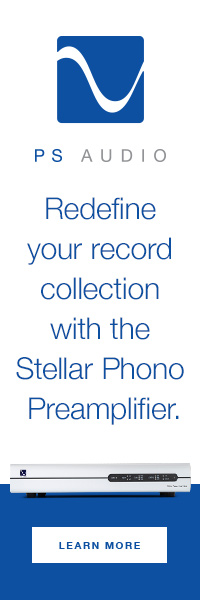The Rega Saturn CD Player
| The Rega Saturn CD Player |
|
Premiere US Review! |
|
September 2006 |

The last year or so found me making a conscious attempt to come to grips with new developments in CD playback. In addition to the CD players I found worthy to review for The Stereo Times (the Creek A-50MkII, Pioneer DV79AVi, Cyrus 8x, and the Rega Apollo) I also listened to a batch of much more expensive players that didn’t make the cut. While the improvement in CD performance was undeniable, the improvement in playback of the analogue items I’ve reviewed during the same period was even greater. Poor CD just can’t seem to win: just when it starts becoming a mature product that finally can create music, analogue playback accelerates so decisively that The Naked Emperor is shorn again of his New Clothes.
This has been the history of the CD format. Compared to high quality analogue LP playback (like Rega’s own turntables, arms, and cartridges, for instance,) or to the even higher reality of live music, the CD falls flat. Indeed those who have been most content with the format have either given up LP altogether or have not ever owned high quality LP playback. All of us when listening to CD, whether consciously or unconsciously, have ceded the reality of music to the CD’s truncated subset of that reality. The asterisk and the parenthesis haunt descriptions of CD performance. “High frequency detail was excellent.” *(for CD.) “Musical expression was very good.” *(but not as good as analogue LP.) Indeed, CD is somewhat like the proverbial daft Aunt Martha ensconced in the attic, whose social performance at festive gatherings is considered downright superlative if she doesn’t initiate a food fight, burn down the house, or end the proceedings with gunplay.
The launch of the Rega Apollo CD player earlier this year was an epoch creating event in the long and troubled history of the CD format. The Apollo is a true breakthrough in CD performance, extracting an intensity of musical expression from the format that many, including myself, despaired of ever hearing. The Apollo’s standard-setting rhythmic articulation and bass clarity, along with the long-established Rega commitment to getting the music rightclearly revealed the aesthetic distortion endemic in most other CD players. Songs played on the Apollo took on depths of meaning completely lost on otherwise fairly adept CD players, the Apollo liberating understanding and insight of musical performance that were significantly truer to the art of the music. For the first time, I found myself listening to CDs without immediately yearning to listen to the LP/turntable version of the disc to hear what the music was really like. (See Apollo review here)
While it was an honor to write the first US review of the Apollo here at The Stereo Times, it was a far greater pleasure to turn fellow music lovers on to a genuinely musical CD player. The Apollo received our “Most Wanted Component Award” this year and has become a runaway sales success at its $995 price. My own Hi-Fi Equipment Kitty, containing a slush fund long ago set aside for the purchase of a truly musically satisfying CD player, was getting very nervous while the Apollo was in-house, awaiting the dreaded and inevitable moment when I would murderously appear, hammer in hand. Only the knowledge that Rega was working on a replacement for its top-of-the-line Jupiter player, incorporating the technological breakthroughs of the Apollo, granted the Hi-Fi Kitty a reprieve. The reprieve was brief. The new Rega Saturn is now available. My Hi-Fi Kitty is extremely nervous again, sleeping fitfully with one eye open and anticipating what the next of its Nine Lives will be like.
The Rega Saturn retails for $2395. It shares the general appearance and functions of the Apollo, including its top-loading transport and its sophisticated Rega-exclusive operating system that optimizes playback for each disc. The Saturn builds on the proven technical features of the Apollo and adds new elements unique to it, featuring, among others, a new master clock, significantly more sophisticated power supplies, and uncompromised parts selection in both digital and analog sections of the player. Rega compares the Apollo to a musical child prodigy, the Saturn to that prodigy become fully mature. The analogy is apt: everything that the Apollo does so wonderfully and musically well, the Saturn does even better, going still deeper into the music with increased subtlety, refinement, detail, and neutrality.
The Saturn’s musical prowess is immediately obvious: this CD player is the easiest to listen to of any I’ve ever heard. It takes just one song and you know. One understands what’s happening musically with an immediacy that is quite rare for any kind of audio component, let alone a CD player. Each instrument on a recording is clearly heard, its tempo, rhythm, phrasing and emotional expression completely open to understanding. It does this for all the instruments playing. One starts listening and responding to the music and forgets about its audio reproduction. This utter immersion into the music has always been the prime signature of Rega products. You don’t have to listen with sharpened ear and sharpened pencil, screwing up your ear to focus on and to note sonic minutiae: you find yourself spinning discs to hear the quality of the music on them, rather than to assay sonic portrayal. This is as it should be: when you’re immersed and swept away by the music, you should be aware of nothing else.
You can hear each and every instrument on the recording clearly and follow what it’s playing even through the most complicated mixes. Instruments don’t suddenly disappear; they stay in focus, allowing one equal perception of the trees and the forest. Vocal performance in particular is exceptional, the Saturn revealing both the expressive means and the expressive meaning of the vocal line, its excellent diction and parsing clearly rendering the lyrics. As good as the Saturn is with solo voices, it is even better at allowing one to understand complex vocal harmonies. You can hear exactly what each individual voice is singing and how it combines with the others to form the overall harmony. On string quartets you can hear chords being formed by the contribution of the individual instruments. This ability to render both the individual notes and the chords they form makes listening to the piano a revelation. The Saturn’s reproduction of bass and drums is outstanding: if you really want to understand the musical contribution of bass and drums, this is the CD player for you. Play the Saturn through Rega’s transmission line-loaded R7 and R9 speakers and you’ll experience standard-setting bass clarity, rhythm, dynamics, and hip-swinging propulsion and brio, allied to a subtlety and nuance that makes other players’ rhythmic performance sound like the rhythmic complexity of a Punk/Thrash Metal garage band. “Dude! Uh, maybe this would sound better if we learned how to play our instruments..”
In many other components clarity is accomplished by a bright and spotlighted projection; indeed it is hard to write the word ‘clarity’without reflexively reaching for the adjective ‘crystal’. The Rega Saturn, however, achieves its quick-on-its-feet clarity free from this kind of glassiness, false brightness and edge. The Saturn lies easy on the ear, allowing one to listen as long as one wants without any of the digital fatigue that often prematurely ends one’s musical enthusiasm. The top three octaves, the frequency range most poorly served by the CD standard’s limited resolution and bandwidth, are handled extremely well. Percussion strokes are heard as individual events, without the glare, smear, and blurring so common to CD playback. Nor are these top octaves falsely tailored and dumbed-down in pursuit of euphony. The Saturn’s portrayal of these octaves strikes me as ideal, permitting musical comprehension without the X-Ray focus that magnifies the CD format’s poor harmonic structure and unnatural sonic decay.
The Saturn excels in replicating the interweaving of music lines, the correct timing of the entrance of instruments, and the sudden and often unexpected inspiration of the players in the process of making music. You sense that inner communication of the players that makes listening to good music such an exciting adventure and such a satisfying experience. With the Saturn you always catch the band on a good night.
We all know that music is the art of sound organized in time, sound itself being a time-based phenomenon. Given these essential aspects of music, it strikes me as quite odd that most US reviewers, High End companies, and audiophiles pay so little attention to the temporal aspects of audio reproduction. Since tempo, rhythm, and timing are the fundamental mechanisms of all music, ignoring the temporal aspects of audio performance (or perhaps worse, dismissively acronyming it ‘PraT’ and considering it an optional feature) is the equivalent of judging a sports car without ever considering its performance on the road. I’ve long admired Rega’s commitment to getting the fundamentals of music right in all the products they produce. While other companies also claim this commitment, Rega is unique in offering reasonably-priced, entire component chains – cartridges, turntable/arms, CD players, tuners, interconnects, integrated amps and pre/power amps, speaker cables, and loudspeakers – designed in accordance with this music-first philosophy. Rega is dedicated to the proposition that sound per se is subsidiary: it is how that sound is organized into musically meaningful patterns that determine the success of a component. Given the CD format’s inherent musical and sonic distortions, integrating CD players into Rega’s design philosophy is an especially difficult task; one is simply awed by the success of the Saturn in getting the fundamentals of music right.
As with the Apollo, the Saturn responded only minimally to isolation devices, offering slight sonic changes but no musical improvement. I therefore did my listening “neat.” The supplied interconnect, while not intimidating in appearance, handily outperformed a batch of other interconnects I usually use as references. Rega’s “Couple” interconnect, featuring Neutrik phono plugs, and retailing at $160, was a worthwhile upgrade in some system contexts, offering a more organic and natural sounding portrayal of the music. Like the Apollo, you won’t have to invest a further $1000 to get the Saturn to sing.
I played the Saturn through 7 different sets of speakers, including my reference Sound Lab Dynastats, which have always been merciless and cruel revealers of CD’s limitations. Listening to the Saturn on the Dynastats revealed only sins of omission. Compared to analogue LP, the Saturn showed less precise tracking of volume changes within individual music lines, more phantom-like images on the soundstage, poorer tracking of the transient envelope of each sound, and far less accurate portrayal of the timbre of orchestral instruments. Since these artifacts are the result of the CD format’s inherent limitations and not a fault of the Saturn’s playback, they cast no shadow on the Saturn’s otherwise superb musical performance. No, it ain’t analogue, but it does organize CD’s inadequate sonics into musically meaningful patterns. Given the tacit acceptance (a whopping big suspension of disbelief) of the CD’s truncated version of musical reality, I can find nothing to criticize about the Saturn’s abilities.
Like all of Rega’s products, the Saturn is designed to perform optimally with other Rega components. I would strongly recommend an initial audition through the Rega R7 or R9 speakers to fully experience the Saturn’s bass and rhythmic potential. System matching should not prove difficult, assuming, of course, musical adroitness in the associated components.
The Saturn is a standout CD player, building substantially onto the strong musical core of the Apollo, and extending sonic and musical performance up to a realm that, to be honest, I never thought the CD could achieve. It sets the standard for musical performance from CD, and moreover does it at a price that, while not impulse buy cheap, does not require oxygen augmentation to absorb. Congratulations to Rega again for serving the cause of music so well.
Paul Szabady
____________________
Address:
Rega Research Limited
119 Park Street
Westcliff-on-Sea
ESSEX
ENGLAND
SS0 7PD
Website: http://www.rega.co.uk/index2.htm
Price: $2395.
US Distributor:
The Sound Organisation
Stephen Daniels
11140 Petal Street
Suite 350
Dallas
Texas 75238
Tel: 001 972 234 0182
Fax: 001 972 234 0249
Website: http://www.soundorg.com/
Email: steve@soundorg.com
![]()
Don’t forget to bookmark us! (CTRL-SHFT-D)
Stereo Times Masthead
Publisher/Founder
Clement Perry
Editor
Dave Thomas
Senior Editors
Frank Alles, Mike Girardi, Russell Lichter, Terry London, Moreno Mitchell, Paul Szabady, Bill Wells, Mike Wright, and Stephen Yan,
Current Contributors
David Abramson, Tim Barrall, Dave Allison, Ron Cook, Lewis Dardick, John Hoffman, Dan Secula, Don Shaulis, Greg Simmons, Eric Teh, Greg Voth, Richard Willie, Ed Van Winkle, Rob Dockery, Richard Doron, and Daveed Turek
Site Management Clement Perry
Ad Designer: Martin Perry





Be the first to comment on: The Rega Saturn CD Player